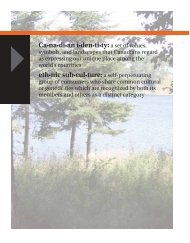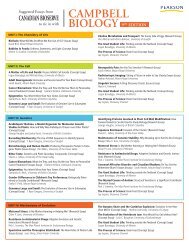PART Introduction to Cultural Anthropology - Pearson Canada
PART Introduction to Cultural Anthropology - Pearson Canada
PART Introduction to Cultural Anthropology - Pearson Canada
Create successful ePaper yourself
Turn your PDF publications into a flip-book with our unique Google optimized e-Paper software.
your way of thinking about the world and your place in<br />
it. On <strong>to</strong>p of that, it can add <strong>to</strong> your ability <strong>to</strong> get a job<br />
that values the kinds of thinking and skills that anthropology<br />
provides.<br />
Majoring in <strong>Anthropology</strong><br />
An anthropology B.A. is a liberal arts degree. It is not,<br />
however, a professional degree, such as a business<br />
degree or a degree in physical therapy. It provides a<br />
solid education relevant <strong>to</strong> many career directions that<br />
are likely <strong>to</strong> require further study, such as law, criminal<br />
justice, medicine and health services, social services,<br />
education, humanitarian assistance, international development<br />
programs, and business. Students interested in<br />
pursuing a B.A. major in anthropology should know<br />
that a degree in this discipline is at least as useful as<br />
other liberal arts majors for either graduate study or a<br />
professional career.<br />
<strong>Anthropology</strong> has several clear advantages over other<br />
liberal arts majors, and employers and graduate schools<br />
are increasingly recognizing these features. <strong>Cultural</strong><br />
anthropology provides knowledge about the world’s<br />
people and diversity. It offers insights about a variety of<br />
specialized research methods. Cross-cultural awareness<br />
and communication skills are valuable assets sought by<br />
business, government, health-care providers, and nongovernmental<br />
organizations.<br />
The question students always ask is this: “Is it possible<br />
<strong>to</strong> get a good job, especially one related <strong>to</strong> anthropology,<br />
with a B.A. in anthropology?” The answer is yes, but it<br />
takes planning and hard work. Do the following: Gain<br />
expertise in at least one foreign language, study abroad,<br />
do service learning during your undergraduate years, and<br />
conduct an independent research project and write up the<br />
results as a professional report or conference paper.<br />
Package these skills on your resumÈ so that they appear<br />
relevant <strong>to</strong> employers. Do not give up. Good jobs are out<br />
there, and coursework and skills in anthropology are<br />
increasingly valued.<br />
<strong>Anthropology</strong> can also be an excellent minor. It complements<br />
almost any other area of study by adding a<br />
cross-cultural perspective. For example, if you are majoring<br />
in music, courses about world music will greatly<br />
enrich your primary interest. The same applies <strong>to</strong> subjects<br />
such as interior design, psychology, criminal justice, international<br />
affairs, economics, political science, and more.<br />
Graduate Study in <strong>Anthropology</strong><br />
Some of you may go on <strong>to</strong> pursue a master’s degree<br />
(M.A.) or doc<strong>to</strong>rate degree (Ph.D.) in anthropology. If<br />
you do, here is some advice: Be passionate about your<br />
interest but also be aware that full-time jobs as a professor<br />
or as a professional anthropologist are not easy <strong>to</strong><br />
get. To expand possibilities of a good job, it is wise <strong>to</strong><br />
consider combining a professional skill with your degree<br />
program in anthropology, such as a law degree, an M.A.<br />
degree in project management, a master’s of public<br />
health (M.P.H.), a certificate in disaster relief, or participation<br />
in a training program in conflict prevention and<br />
resolution.<br />
Useful skills will make your anthropology degree more<br />
powerful. In biological anthropology, it may be course<br />
work in ana<strong>to</strong>my that helps you get a job working in a<br />
forensics lab or teaching ana<strong>to</strong>my in a medical school. In<br />
archaeology, it may be your experience on a summer dig<br />
that helps you get a job with a firm that investigates<br />
building sites before construction begins <strong>to</strong> check for the<br />
presence of fossils or artifacts. In cultural anthropology,<br />
cross-cultural experiences or knowledge of a foreign<br />
language may get you a position with an international aid<br />
organization. In linguistic anthropology, your knowledge<br />
of bilingualism means that you can help design a more<br />
effective program for teaching English <strong>to</strong> refugees or<br />
immigrants.<br />
Living an Anthropological Life<br />
Studying cultural anthropology makes for smart people<br />
and people with breadth and flexibility. In North<br />
America, university graduates are likely <strong>to</strong> change careers<br />
(not just jobs, but careers) several times in their lives. You<br />
never know where you are going <strong>to</strong> end up working, or<br />
in what endeavour. So it pays <strong>to</strong> be broadly informed<br />
about the world. <strong>Cultural</strong> anthropology will help you <strong>to</strong><br />
ask original and important questions about the world’s<br />
people and their relationships with one another and <strong>to</strong><br />
provide original and important answers. It will enrich<br />
your daily life by increasing your exposure <strong>to</strong> the world’s<br />
cultures. When you pick up a newspaper, you will invariably<br />
find articles that connect with what you have<br />
learned in your anthropology classes. You will be able <strong>to</strong><br />
view your own everyday life as culturally constructed in<br />
interesting and meaningful ways.<br />
CHAPTER 1 ■ <strong>Anthropology</strong> and the Study of Culture 29
















